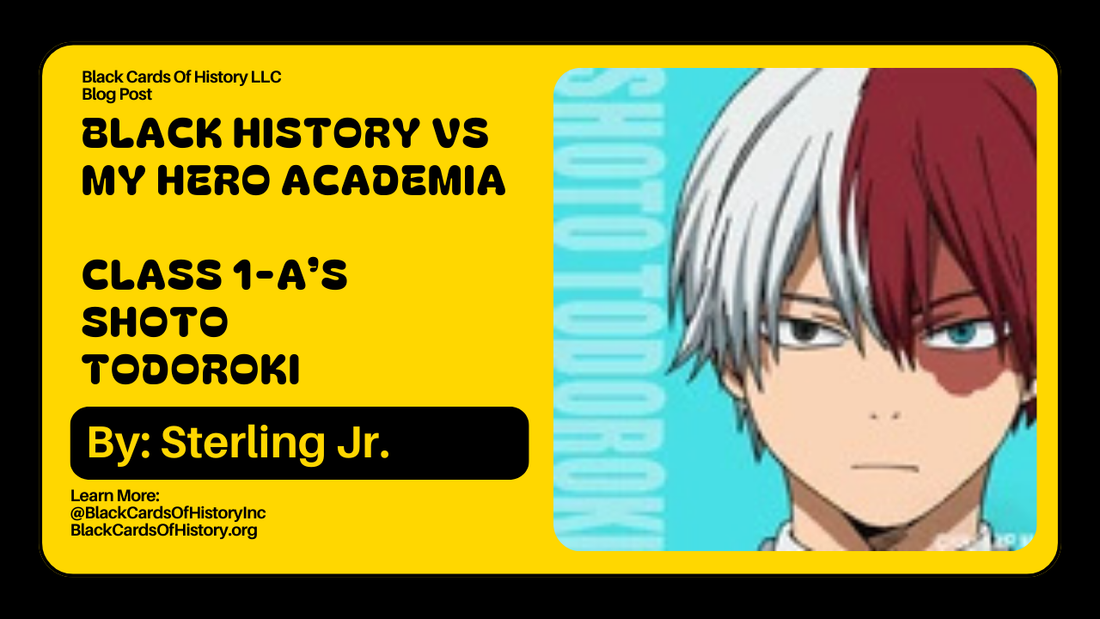Cold Fire, Warm Heart: Shoto Todoroki and the Lessons of Black History
Rise Beyond Legacy x My Hero Academia Final Season Problogs
By Sterling, Founder of Black Cards Of History LLC
Introduction
When people think of Shoto Todoroki, they immediately picture his iconic half-cold, half-hot Quirk. But to me, his real power has nothing to do with fire or ice—it’s in the quiet strength he carries through his trauma, his empathy, and his unwavering sense of justice. In my Rise Beyond Legacy x My Hero Academia series, I want to highlight how Todoroki represents something far more powerful than flashy moves: the stillness of thought and the power of introspection. That’s the same type of depth we see in the legacy of Black excellence.
Todoroki’s reserved nature and thoughtful demeanor make him an ideal lens for exploring how personal ambition and economic justice intersect with Black history. His approach may not be loud or performative, but it would be deeply sincere. And that sincerity is what matters most, along with why I give Todoroki an 8/10.
Section One: The Silent Scholar – A Quiet Ally With Loud Integrity
Todoroki is not the kind of person who would show up at a rally yelling chants, but he is the kind of person who would stay up all night reading about Claudette Colvin, Bayard Rustin, or Ida B. Wells. His support would come through personal research, reflection, and respect. He wouldn’t pretend to be an expert—but that humility makes his contribution even more valuable.
I imagine him approaching Black History Month with the same sense of duty he applies to everything else in his life. His trauma has taught him how deep-rooted pain can shape identity, and in that pain, he would find connection. He’d study the systemic barriers that many Black figures have faced—not out of guilt, but out of an earnest desire to understand, to acknowledge, and to uplift.
His calm demeanor would not mean disengagement—it would signal that he is listening.
Section Two: History Meets Reflection – Overcoming Struggles Together
What strikes me most about Todoroki is how he’s always searching for clarity in the chaos of his past. And when I think about Black excellence, I think about the same journey—resilience through pain, finding self-worth in a system built to deny it, and still pushing forward with elegance and power.
For his Black History Month contribution, I believe Todoroki would center his project on the legacy of those who fought adversity with intelligence and moral fortitude. Figures like Frederick Douglass, Harriet Jacobs, and Malcolm X would appeal to him—individuals who had complex pasts but chose to mold them into something transformative.
He would draw parallels between his own struggle with his father’s control and the broader societal constraints faced by Black pioneers. Through this comparison, Todoroki wouldn’t center himself—he would bridge understanding.
His humility would allow his classmates to absorb difficult lessons without defensiveness. And in doing so, he’d help foster meaningful discussions around justice, trauma, growth, and healing.
Section Three: The YouTube Video – Bridging Past and Present
If Todoroki were to create a YouTube video as a class assignment, the title might be:
“Overcoming Struggles: Lessons from Black History.”
Simple. Direct. And deeply felt.
It would likely begin with Todoroki standing alone in a quiet room, maybe with minimal background music—something soft, almost mournful. He’d open with a quote from someone like James Baldwin or Audre Lorde. The screen might fade into black-and-white portraits of Black leaders as he narrates their stories, not with flair, but with grace.
There would be no jump-cuts, no flashy edits. Just a calm, measured voice recounting how generations of Black individuals found the strength to rise—just like he had to.
It would end not with a call to action, but with a moment of silence—a space for viewers to reflect. That’s Todoroki’s style: slow-burning impact, not fast emotional punches.
Section Four: Black Excellence Through Todoroki’s Lens – Economic Justice and Personal Growth
To Todoroki, Black excellence wouldn’t just be about celebration—it would be about justice. He’d want to understand how economic systems have historically failed Black communities and how access to wealth, safety, and education are forms of justice.
I could see him researching Black Wall Street, the Redlining Crisis, or how figures like Madam C.J. Walker turned ambition into economic empowerment. Todoroki would see that power isn’t always about brute force—it’s also about building something when the world refuses to give you bricks.
And in that, he’d see his own ambition mirrored. He wants to be a hero on his own terms—not the one his father molded, but one who stands for fairness and truth. He’d view supporting Black economic progress as part of that journey.
Because to him, allyship isn’t charity—it’s responsibility.
Conclusion: Why Todoroki’s Approach Matters
Not everyone shows their support with speeches, parades, or slogans. Some do it through reverent study, sincere acknowledgement, and personal growth. Shoto Todoroki teaches us that sometimes, the deepest respect comes from listening more than talking.
In a world obsessed with optics, Todoroki reminds us that substance is what lasts. And in connecting Black excellence with resilience, he proves that justice doesn’t always roar—sometimes it whispers. But its impact is felt just the same.
And that’s the kind of legacy worth rising beyond.

